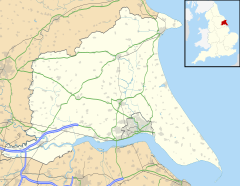Leven, Yorkshire
| Leven | |
|---|---|
 Leven |
|
| Leven shown within the East Riding of Yorkshire | |
| Population | 2,433 (2011 census) |
| OS grid reference | TA106452 |
| • London | 165 mi (266 km) S |
| Civil parish |
|
| Unitary authority | |
| Ceremonial county | |
| Region | |
| Country | England |
| Sovereign state | United Kingdom |
| Post town | BEVERLEY |
| Postcode district | HU17 |
| Dialling code | 01964 |
| Police | Humberside |
| Fire | Humberside |
| Ambulance | Yorkshire |
| EU Parliament | Yorkshire and the Humber |
| UK Parliament | |
Leven is a village and civil parish in the East Riding of Yorkshire, England. It is situated approximately 7 miles (11 km) west of Hornsea town centre, and north-west of the A165 road.
According to the 2011 UK census, Leven parish had a population of 2,433, an increase on the 2001 UK census figure of 2,240.
It is believed that the village of Little Leven - immediately west of the present village - began as far back as the days of the Ancient Britons, though Neolithic and Bronze Age human occupation of the area is known. Finds from Leven 'Carrs' (marshy land) have included axe heads, leaf-shaped swords, and a spearhead.
Three quarters of a mile west of Little Leven, at Hall Garth, is the site of Leven's former parish church - St Faith's - which was in use between 1350 and 1843. It is speculated that the original village of Leven was sited in its immediate vicinity though archaeological understanding of that area is sparse.
In 1823 Leven (then spelt 'Leaven'), was a civil parish in the Wapentake and Liberty of Holderness. The patronage of the church was under Sir William Pennyman. Population at the time was 658. Occupations included eight farmers, three wheelwrights, two blacksmiths, two butchers, three corn millers, five shoemakers, two maltsters, two grocers, a bricklayer, a schoolmaster, a parish clerk, and the landlords of The Minerva and the Blue Bell public houses. Four carriers operated between the village and Beverley and Hull twice weekly. There were two other carriers: one taking post by foot to Hornsea four times a week; and another to Hull once a week by water transport. Residents included the parish rector, three yeomen, a gentleman, and a merchant.
...
Wikipedia

